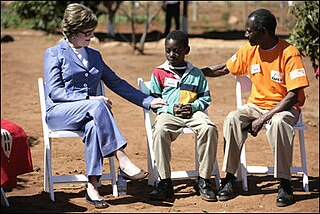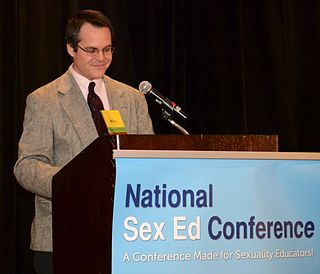Related Research Articles

Safe sex is sexual activity using methods or contraceptive devices to reduce the risk of transmitting or acquiring sexually transmitted infections (STIs), especially HIV. "Safe sex" is also sometimes referred to as safer sex or protected sex to indicate that some safe sex practices do not eliminate STI risks. It is also sometimes used colloquially to describe methods aimed at preventing pregnancy that may or may not also lower STI risks.

Sexual abstinence or sexual restraint is the practice of refraining from some or all aspects of sexual activity for medical, psychological, legal, social, philosophical, moral, religious or other reasons. Sexual abstinence is distinct from asexuality, which is a sexual orientation where people feel little or no sexual attraction. Celibacy is sexual abstinence generally motivated by factors such as an individual's personal or religious beliefs. Sexual abstinence before marriage is required in some societies by social norms, or by law in some countries. It is a part of chastity.

Sex education, also known as sexual education, sexualityeducation or sex ed, is the instruction of issues relating to human sexuality, including human sexual anatomy, sexual activity, sexual reproduction, safe sex and birth control, sexual health, reproductive health, emotional relations and responsibilities, age of consent, and reproductive rights. Sex education which includes all of these issues is known as comprehensive sex education, and is often opposed to abstinence-only sex education, which only focuses on sexual abstinence. Sex education may be provided as part of school programs, public health campaigns, or by parents or caregivers. In some countries it is known as "Relationships and Sexual Health Education".

Minnie Joycelyn Elders is an American pediatrician and public health administrator who served as Surgeon General of the United States from 1993 to 1994. A vice admiral in the Public Health Service Commissioned Corps, she was the second woman, second person of color, and first African American to serve as Surgeon General.
The sex-positive movement is a social and philosophical movement that seeks to change cultural attitudes and norms around sexuality, promoting the recognition of sexuality as a natural and healthy part of the human experience and emphasizing the importance of personal sovereignty, safer sex practices, and consensual sex. It covers every aspect of sexual identity including gender expression, orientation, relationship to the body, relationship-style choice, and reproductive rights. Sex-positivity is "an attitude towards human sexuality that regards all consensual sexual activities as fundamentally healthy and pleasurable, encouraging sexual pleasure and experimentation." It challenges societal taboos and aims to promote healthy and consensual sexual activities. The sex-positive movement also advocates for comprehensive sex education and safe sex as part of its campaign. The movement generally makes no moral distinctions among types of sexual activities, regarding these choices as matters of personal preference.
Antisexualism is opposition or hostility towards sexual behavior and sexuality.
The law of chastity is a moral code defined by the Church of Jesus Christ of Latter-day Saints. According to the church, chastity means that "sexual relations are proper only between a man and a woman who are legally and lawfully wedded as husband and wife." Therefore, abstinence from sexual relations outside of marriage, and complete fidelity to one's spouse during marriage, are required. As part of the law of chastity, the church teaches its members to abstain from adultery and fornication.

Abstinence-only sex education is a form of sex education that teaches not having sex outside of marriage. It often excludes other types of sexual and reproductive health education, such as birth control and safe sex. Comprehensive sex education, by contrast, covers the use of birth control and sexual abstinence.
Comprehensive sexuality education (CSE) is a sex education instruction method based on a curriculum that aims to give students the knowledge, attitudes, skills, and values to make appropriate and healthy choices in their sexual lives. The intention is that this understanding will prevent students from contracting sexually transmitted infections, such as HIV and HPV. CSE is also designed with the intention of reducing unplanned and unwanted pregnancies, as well as lowering rates of domestic and sexual violence, thus contributing to a healthier society, both physically and mentally.
Abstinence, be faithful, use a condom, also known as the ABC strategy or abstinence-plus sex education, also known as abstinence-based sex education, is a sex education policy based on a combination of "risk avoidance" and harm reduction which modifies the approach of abstinence-only sex education by including education about the value of partner reduction safe sex and birth control methods. Abstinence-only sex education is strictly to promote the sexual abstinence until marriage, and does not teach about safe sex or contraceptives. The abstinence-based sex education program is meant to stress abstinence and include information on safe sex practices. In general terms, this strategy of sex education is a compromise between abstinence-only education and comprehensive sex education. The ABC approach was developed in response to the growing epidemic of HIV/AIDS in Africa, and to prevent the spread of other sexually transmitted diseases. This approach has been credited by some with the falling numbers of those infected with AIDS in Uganda, Kenya and Zimbabwe, among others. From 1990 to 2001 the percentage of Ugandans living with AIDS fell from 15% to between 5 and 6%. This fall is believed to result from the employment of the ABC approach, especially reduction in the number of sex partners, called "Zero-Grazing" in Uganda.
Adolescent sexuality is a stage of human development in which adolescents experience and explore sexual feelings. Interest in sexuality intensifies during the onset of puberty, and sexuality is often a vital aspect of teenagers' lives. Sexual interest may be expressed in a number of ways, such as flirting, kissing, masturbation, or having sex with a partner. Sexual interest among adolescents, as among adults, can vary greatly, and is influenced by cultural norms and mores, sex education, as well as comprehensive sexuality education provided, sexual orientation, and social controls such as age-of-consent laws.
Among the world's religions, views on masturbation vary widely. Some religions view it as a spiritually detrimental practice, some see it as not spiritually detrimental and others take a situational view. Among these latter religions, some view masturbation as allowable if used as a means towards sexual self-control, or as part of healthy self-exploration, but disallow it if it is done with motives they consider to be wrong, or as an addiction. For example, Christian denominations have different views on masturbation. Today, Roman Catholic, Eastern Orthodox, Oriental Orthodox and some Protestant Christians consider masturbation to be a sin. Many Protestant churches in Northern and Western Europe and some Protestant churches in Northern America and in Australia/New Zealand see masturbation as not a sin.
The sexuality of US adolescents includes their feelings, behaviors and development, and the place adolescent sexuality has in American society, including the response of the government, educators, parents, and other interested groups.

Masturbation is the sexual stimulation of one's own genitals for sexual arousal or other sexual pleasure, usually to the point of orgasm. The stimulation may involve hands, fingers, everyday objects, sex toys such as vibrators, or combinations of these. Manual sex is masturbation by a sexual partner and may be used as a form of non-penetrative sex.

William J. Taverner, MA, commonly known as Bill Taverner, is the editor of the American Journal of Sexuality Education and the executive director of the Center for Sex Education (CSE). He has co-authored numerous sexuality education manuals, including All Together Now: Teaching about Contraception and Safer Sex, Making Sense of Abstinence: Lessons for Comprehensive Sex Education, Positive Images: Teaching Abstinence, Contraception, and Sexual Health,Streetwise to Sex-Wise: Sexuality Education for High-Risk Youth, and Older, Wiser, Sexually Smarter.
Advocates for Youth is a nonprofit organization and advocacy group based in Washington, D.C., United States, dedicated to sexuality education, the prevention of HIV and of sexually transmitted disease, teenage pregnancy prevention, youth access to condoms and contraception, equality for LGBT youth, and youth participation. In addition, Advocates for Youth sponsors media campaigns and other forms of outreach which attempt to change societal norms to be more understanding of, accepting, of, and responsible about youth sexuality and to drive youth sexual health equity.
Sex education in the United States is taught in two main forms: comprehensive sex education and abstinence-only as part of the Adolescent Family Life Act, or AFLA. Comprehensive sex education is also called abstinence-based, abstinence-plus, abstinence-plus-risk-reduction, and sexual risk reduction sex education. This approach covers abstinence as a choice option, but also informs adolescents about human sexuality, age of consent and the availability of contraception and techniques to avoid contraction of sexually transmitted infections. Every state within the U.S. has a mandated AIDS Education Program.

It's Perfectly Normal: Changing Bodies, Growing Up, Sex, and Sexual Health is a children's book written by Robie Harris and illustrated by Michael Emberley. The purpose of the book is to inform preadolescent children about puberty by exploring different definitions of sex. It was first published in 1994 by Candlewick Press, and has since been updated with new information. Harris was prompted to write It’s Perfectly Normal by her editor so young individuals would understand aspects of sexual health. The book has won multiple accolades and appraisal for its accurate information and its normalization of body changes and human sexuality. However, it has also been a source of controversy because of its graphic images that some consider inappropriate for the targeted age range. Many of Harris’s books, including It’s Perfectly Normal, have appeared on the American Library Association's Most Challenged Books list frequently since 2005. It’s Perfectly Normal has additional anniversary editions that were published in 2004, 2009, and 2014. The book has also been translated in 27 languages.
Uganda is one of the few Sub-Saharan African countries that has adopted abstinence-only sex education as an approach of sexual education that emphasizes abstinence from sexual intercourse until marriage as the only option. Abstinence-only sex education does not include joint curriculum covering other options including safe sex practices, family planning, and is espoused as the only sure way to avoid pregnancy and sexually transmitted infections. Uganda is commonly recognized as an exemplary case of lowering the rate of HIV prevalence. Prevalence figures may have also been distorted by the lack of treatment, meaning that the percentage of infected is decreased by disproportionately early deaths. Abstinence-only sex education has been implemented and supported for this cause to a large degree in Uganda, to some controversy. Critics have questioned its effectiveness in lowering HIV/AIDS transmission. They have also highlighted discrimination, gender inequality and social stigma as the outcomes of the program in Uganda.
NoFap is a website and community forum that serves as a support group for those who wish to give up pornography and masturbation. Its name comes from the slang term fap, referring to male masturbation. While reasons for this abstinence vary by individual, the main motivation cited is attempting to overcome addiction to pornography, or other compulsive sexual behaviours. Other reasons for abstinence include religious and moral reasons, self-improvement, and physical beliefs that are not supported by medicine.
References
- ↑ "Empire State Acts" (PDF). Getthefactsny.org. Archived from the original (PDF) on 26 July 2011. Retrieved 3 September 2017.
- ↑ "Making Sense of Abstinence : Lessons for Comprehensive Sexuality Education" (PDF). Moappp.org. February 8, 2006. Retrieved 3 September 2017.
- ↑ "Sexual Intelligence by Marty Klein, Ph.D." Sexualintelligence.org. Retrieved 3 September 2017.
- ↑ "Faith and Freedom" (PDF). Faithandfreedom.us. Retrieved 3 September 2017.